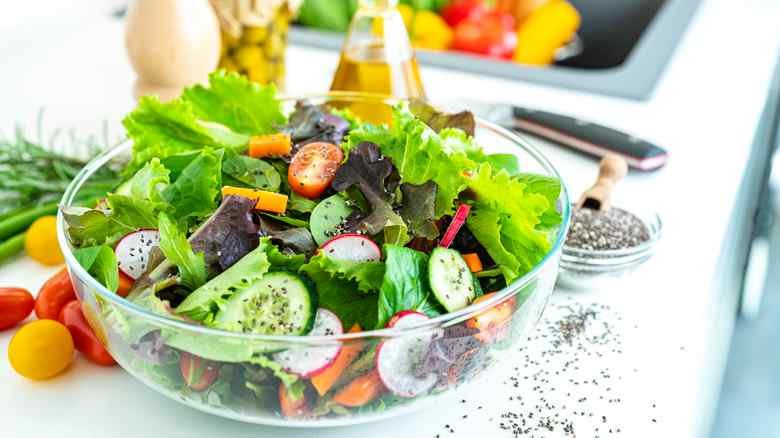Toss that vibrant salad with confidence! The age-old question of aluminum pans and leafy greens might leave you wondering.
Absolutely! Aluminum pans are safe for most salads. But, if your salad has acidic ingredients like vinegar or lemon juice, it’s best to transfer it to a non-reactive bowl after a short while to avoid any metallic taste.
There’s more to this culinary conundrum than meets the eye. Let’s explore the nuances of this pairing for your next kitchen creation.
Is It Safe to Put Salad in an Aluminum Pan?

Is it safe to put salad in an aluminum pan? That depends! Mixing your greens with acidic ingredients like vinaigrette can trigger a chemical reaction with the metal.
While not a huge issue for quick storage, over time it may impact the flavor and look of your salad. Not exactly appetizing, right?
But there’s good news! Some salad types fare better in aluminum than others. If yours is mainly leafy veggies without much acidic dressing, short-term aluminum storage is likely a-okay.
Want to play it super safe though? Plenty of great alternatives exist! Glass, ceramic, or stainless steel containers won’t interact with your ingredients. Bonus: they’re eco-friendly and reusable. Win-win!
At the end of the day, just be mindful about what you’re storing and for how long. Armed with the facts, you can keep those salads crisp, delicious, and perfectly edible!
Why Do People Use Aluminum Pans for Salad?

Aluminum pans are a popular choice for salads because they’re just so darn convenient, affordable, and easy to tote around. Need to bring a salad to your cousin’s backyard barbecue?
Grab an aluminum pan, and you’re good to go! Planning a picnic in the park with your pals? An aluminum pan keeps your salad safe and sound without weighing you down.
Plus, let’s be real – not everyone has a fancy serving dish lying around for every occasion. Aluminum pans are like the budget-friendly bestie that’s always there when you need ’em. You can snag a pack at practically any store without breaking the bank.
Now, here’s the thing – some folks might think aluminum is A-OK for all foods, salads included. But that’s not entirely accurate. There are a few things to keep in mind when using aluminum pans for your leafy creations:
- Acidity matters: Some salad ingredients, like tomatoes or vinaigrettes, can be pretty acidic. And when acidic foods mingle with aluminum, it can cause a chemical reaction that leaves your salad tasting a bit…off.
- Time is of the essence: The longer your salad sits in an aluminum pan, the more likely it’s to pick up a metallic taste. So, if you’re prepping ahead, consider transferring your salad to a different container before serving.
- Scratches and scrapes: If your aluminum pan is looking a little worse for wear with scratches or dings, it’s best to retire it from salad duty. Those imperfections can lead to more aluminum leaching into your food.
But even with these considerations, it’s no shocker that aluminum pans remain a go-to for many salad enthusiasts. They’re just so easy to use, transport, and toss when you’re done. No wonder they’re a staple at potlucks, picnics, and gatherings galore!
Which Salads Are More Likely to React with Aluminum?

Watch out for these salad ingredients that can react badly with aluminum pans and leave your dish tasting metallic and off:
Vinegar-based dressings are a big no-no. The acidity breaks down the aluminum, giving your salad a funky flavor you definitely don’t want. Same goes for citrus fruits and juices like lemons and limes.
Tomatoes, whether they’re fresh or in a dressing, are another ingredient to steer clear of in aluminum. Why? You guessed it – acidity strikes again.
And those tasty pickled veggies like onions or cukes? The vinegar used to pickle them will cause a reaction with the aluminum too. No bueno.
So what’s a salad lover to do? Ditch the aluminum and opt for glass, ceramic, or stainless steel serving dishes instead when you’re using these reactive ingredients.
That way, you can serve up a delicious, untainted salad that’ll have everyone coming back for seconds at your next party or family dinner.
Don’t let a simple pan choice ruin your perfectly crafted salad. Be smart, be proactive, and keep that salad tasting fresh and fantastic.
Which Salads Are Less Likely to React with Aluminum?

Salads that are less likely to react with aluminum:
- Creamy salads dressed with mayo or yogurt-based dressings. The creamy dressing acts as a barrier between the salad ingredients and the aluminum, minimizing any potential reactions.
- Oil and vinegar dressed salads, using a balanced vinaigrette. Go easy on the vinegar though, as too much acidity can still cause some reaction with the aluminum.
- Salads that don’t rely on citrus juices like lemon or lime. While these juices add bright flavor, they’re also highly acidic and can react with the aluminum pan.
- Simple garden salads featuring lettuce, tomatoes, cucumbers, and a mild dressing. Stick to the basics and save more acidic ingredients like berries or tropical fruits for another dish not served in aluminum.
The key is to minimize contact between acidic ingredients and the aluminum pan. By opting for creamy dressings, using vinegar sparingly, skipping citrus, and sticking with simple ingredients, you can create delicious salads that won’t end up with any off-putting metallic flavors from reacting with the pan.
How to Minimize the Risk of Reaction (If You Must Use Aluminum)

Avoiding aluminum pans is your best bet when making salads, but sometimes you just gotta work with what you’ve got.
No aluminum pan liners on hand? No problem! Grab some parchment paper and create a barrier between your greens and that reactive metal. It’s a simple fix that’ll keep your salad tasting fresh.
Or, get a little creative and use lettuce leaves as a natural liner. Big, sturdy leaves like romaine or butter lettuce work best.
Not only will they prevent unwanted reactions, but they’ll also add some visual flair to your presentation. Talk about a win-win!
Once the salad’s been devoured, don’t let the leftovers linger in that aluminum pan. Transfer ’em to a different container pronto. The longer your salad sits in aluminum, the higher the risk of a funky reaction.


